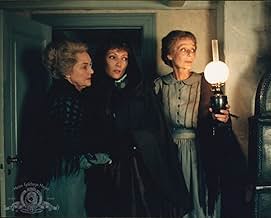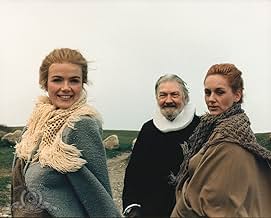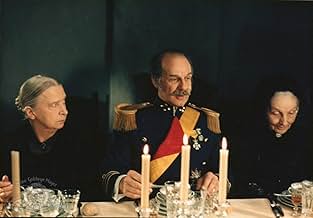IMDb RATING
7.8/10
23K
YOUR RATING
During the late 19th century, a strict religious community in a Danish village takes in a French refugee from the Franco-Prussian War as a servant to the late pastor's daughters.During the late 19th century, a strict religious community in a Danish village takes in a French refugee from the Franco-Prussian War as a servant to the late pastor's daughters.During the late 19th century, a strict religious community in a Danish village takes in a French refugee from the Franco-Prussian War as a servant to the late pastor's daughters.
- Director
- Writers
- Stars
- Won 1 Oscar
- 11 wins & 8 nominations total
Stéphane Audran
- Babette Hersant
- (as Stephane Audran)
Jean-Philippe Lafont
- Achille Papin
- (as Jean Philippe Lafont)
Ghita Nørby
- Narrator
- (voice)
Asta Esper Hagen Andersen
- Anna
- (as Asta Esper Andersen)
- Director
- Writers
- All cast & crew
- Production, box office & more at IMDbPro
Featured reviews
"Babette's Feast" proves that not all film theories and formulas are true 100% of the time. Here's a story where there is no life-or-death conflict, no raging anger, no violent outbursts. Nothing blowed up real good, and there is nothing resembling a chase scene. The conflict is about the ways in which people can be nice to each other. Their personal differences of passion or conviction are not as important as the ways in which they can connect with each other.
How shockingly refreshing.
There is an undercurrent to this film that gives it the feel of a Garrison Keillor monologue, in that it is built around people's personal foibles and quirks.
Even more refreshing is how "Babette's Feast" manages to be nice without becoming cloying, saccharine, facile, superficial or insincere. People's personal passions are portrayed not only from their own perspective, but from the perspective of the people they affect, with more realism than you usually get in film, yet also with sincere and infectious optimism.
If you don't come away from "Babette's Feast" smiling and feeling better, then you must have been distracted from giving it your full attention. This is one of those very rare films that you can recommend to everyone you know. It is truly in a class by itself. Like Mary Poppins, "Practically perfect in every way."
Utterly charming and subtly stunning.
How shockingly refreshing.
There is an undercurrent to this film that gives it the feel of a Garrison Keillor monologue, in that it is built around people's personal foibles and quirks.
Even more refreshing is how "Babette's Feast" manages to be nice without becoming cloying, saccharine, facile, superficial or insincere. People's personal passions are portrayed not only from their own perspective, but from the perspective of the people they affect, with more realism than you usually get in film, yet also with sincere and infectious optimism.
If you don't come away from "Babette's Feast" smiling and feeling better, then you must have been distracted from giving it your full attention. This is one of those very rare films that you can recommend to everyone you know. It is truly in a class by itself. Like Mary Poppins, "Practically perfect in every way."
Utterly charming and subtly stunning.
The 1987 Oscar winner for Best Foreign Film is an austere but ultimately joyous fable set on a desolate spit of coastline in northern Denmark, where for sustenance the puritan townsfolk rely first on prayer and afterwards on their daily ration of a thin, brown gruel made from soggy bread crusts and dehydrated flounder. But all that changes with the arrival from Paris of an attractive refugee (the story takes place during the French Revolution) who thanks her benefactors, and tests their strict religious principles, by preparing a sinfully delicious gourmet feast for the entire town. The meal is more than enough to tempt even the most devout ascetic, but of course the dour villagers do their best to look as if they're not enjoying each luxurious mouthful. It's rare these days to find a film so unafraid of simple virtues, without even a trace of malice or cynicism to spoil its bittersweet charm. In the end the gap dividing the villagers' spiritual and earthly appetites is happily bridged, proving again that few things (except perhaps a good movie) are as life embracing as a hearty meal.
This delicately told and moving story about the two devout daughters of a Danish Lutheran minister and their French servant is one of the finest European films of the 1980s. Set in a small, remote, austere Danish seaside town in the mid-19th century, the daughters devote their lives to continuing the work of their father in service of God, and in care for their needy townspeople. One of the daughters had turned down a promising opera career -- and the love of her French voice coach (a famous opera singer himself) -- to remain with her father and the town. Many years later the French singer sends a woman (Babette) -- who had lost her family in an outbreak of civil war -- to live with the sisters. She turns out to be an excellent cook, housekeeper and a shrewd shopper. The story culminates in a sumptuous feast prepared by Babette coinciding with a memorial to the reverend minister's 100th birthday. This delicious screenplay was adapted from the Isak Denisson (pen name for Karen Blixen) short story originally published in the Ladies Home Journal.
One evening when I was working in the lab, I developed this intense pang of hunger. I decided to go downstairs to the cafeteria and scrap together a dinner when I noticed a few random folk gathered in front of the adjacent theater. Since the building was usually empty by that hour I couldn't help feeling curious and since I always eavesdrop on conversations I soon discovered that they were showing old films in the theater. So, I bought a few vendor snacks and decided to join them for a viewing. That was one of the best work related decisions I ever made as an undergrad. That movie made me reconsider my second shift job at the lab and check out enrollment into the local culinary art schools. Well, I didn't become a chef but I did abandon biology for a more creative outlet and realized that being home before dinner is an important part of better living. Babette's Feast - a movie that had me reevaluate my life and consider a career change. How many flicks do that? Best movie ever.
If you find the first 30 minutes of this film to be so slow that you wonder why you're watching it, don't give up. Also, hearing the Danish language is a bit new to most North Americans, who don't see and hear a lot of Danish films. Anyway, as the film progressed it got better and better and the viewer is rewarded for his/her patience.
Being a fan of the movie, "Out Of Africa," this film piqued my interest because it's based on a short novel by Isak Dinesen (Karen Blixen), the major character in that film.
The meal - Babette's feast - was amazing. I'm no chef, but I was impressed! How one interprets the story, too, varies, I suppose depending on how much you read into this, and where you stand religion-wise. If the latter, how you look at the definition of "legalism" can affect how you interpret this story.
In any case, it's a fine film, but don't watch this if you're dieting.
Being a fan of the movie, "Out Of Africa," this film piqued my interest because it's based on a short novel by Isak Dinesen (Karen Blixen), the major character in that film.
The meal - Babette's feast - was amazing. I'm no chef, but I was impressed! How one interprets the story, too, varies, I suppose depending on how much you read into this, and where you stand religion-wise. If the latter, how you look at the definition of "legalism" can affect how you interpret this story.
In any case, it's a fine film, but don't watch this if you're dieting.
Did you know
- TriviaFirst Danish movie to win an Academy Award for best foreign language film.
- GoofsIn 1871 Babette pays with skilling, which was the currency used at that time; 14 years later, Babette still uses skilling, but Denmark changed the currency in 1875 from skilling to kroner and orer.
- ConnectionsEdited into Eventyret om dansk film 18: Nye perspektiver - 1970-1987 (1996)
- SoundtracksWaltz No. 15 in A-flat major Op. 39
(arranged for orchestra) (uncredited)
Written by Johannes Brahms
Played during the dance hosted by the Royal family
Details
Box office
- Gross US & Canada
- $4,398,938
- Gross worldwide
- $4,637,920
- Runtime
- 1h 43m(103 min)
- Sound mix
- Aspect ratio
- 1.66 : 1
Contribute to this page
Suggest an edit or add missing content



















